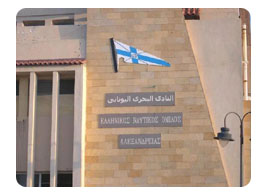
Towards the Fort of Qaibey, is the Alexandria Nautical Greek Club. One of the most popular eateries in the city today, it boasts a clientele that encompasses a wide range in terms of age and social standing though in that particular respect a not too flagrant gap. With the Greek club, a paradox of sorts makes it a unique and very Alexandrian case in point. Unless one was Greek and knew of its existence, situated as it is in Bahari, it was not in the past an Alexandrian's first choice for a meal or a dinner out. The fact that it was a club, naturally, excluded the possibility of non members having any access to its premises. More importantly, it was one place long after the days of Stanley and San Stefano, where people were able to enjoy what is probably the only beach in Alexandria where food and drink are served in a simple, friendly and welcoming environment and at affordable prices. A beer could be ordered and would be accompanied by peanuts, fried squid in small quantities are allowed on the beach. A small earthenware “bram” of moussaka, fries, a salad, Greek or other would be happily served by very willing and obliging waiters who didn't have to plod their way through too many umbrellas or across miles of heavy sand since the whole area is a mere few meters. So much for the beach. On the first floor is a very modest dining room frequented by the members and that was a restrictive dimension of the Greek Club experience. However, once it was decided by a new management that its third floor which had hitherto been much neglected would be slightly refurbished and open to the public, the once relatively secluded club experienced a sudden twist of fate. Perhaps not an overnight success, but the minute word went around that there was a new eatery in town that promised a view of the sea, it was almost an instant success. Given its size, and a certain Mediterranean character, word of mouth was almost all it would take in Alexandria to spread the news.
Of course, the Tikka was already in the area, and so was the Fish Market, both offering much of the same, however, the lure and the success of the Greek Club was another instance of the ethereal, inexplicable if not totally, elusive and delightful extra zest and ingredient of a holistic paradigm of success. Much smaller than the Tikka and therefore unable to accommodate as many at a time, the restaurant, called Blue and White, became even more enticing. Reservations often had to be made well in advance to secure a table and not have to drive all the way in vain. Tables were set on the terrace with a view of the sea extending along the horizon and overlooking the Yacht Club. An indoor dining area is also available, and gatherings of a more business nature would sometimes prefer the privacy of the dining room. The food is so far tasty and the menu though in great part Greek, includes dishes from Mediterranean and Egyptian cuisine. The mezzeh is varied and especially good, with grilled octopus, tarama and a specialite maison: the zucchini croquettes. During Ramadan, lunch and dinner would be served as usual, but Iftar has been introduced. The management is undoubtedly a skilled one, and a marketing strategy of sorts has definitely breathed new life into it and put wind in its sails. The list of VIP clients is impressive and the management is especially proud of what they have managed to achieve in a relatively short period of time. The elitist clientele is not such that it would be inhibiting or disconcerting to the regular middle class Egyptian, and this, apart from being one more reason for it, should be deemed a measure of its success.
An Alexandrian may be unable to explain away the lure of the place as much as someone less familiar and accustomed to the city, unless one departs into an unconditional eulogy, or the “where to dine tonight” journalistic format. A view, a menu for all tastes, including the exotic and the gourmet, liquor served and a reasonable price list, set in an atmosphere friendly and cozy, yet not too detached as to exclude the typical Alexandrian love of socializing, of "seeing and being seen", did much to ensure the potential for success. The rest remains an unknown ingredient, which in this particular case has a lot more than the normal dose to do with an affinity in nature, a conviviality that permeates the place. The dissemination of warmth emanating from a hearty flavorful meal will go a long way to bring people and peoples together, which in the case of the Greeks has been taken care of for longer than we can say.